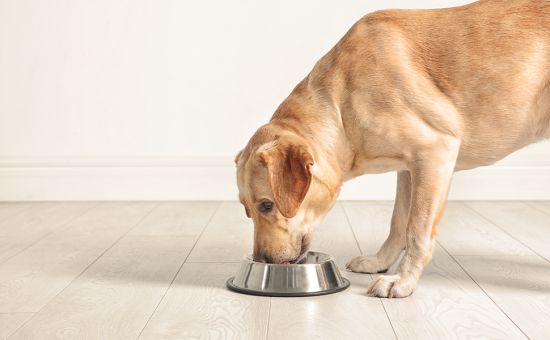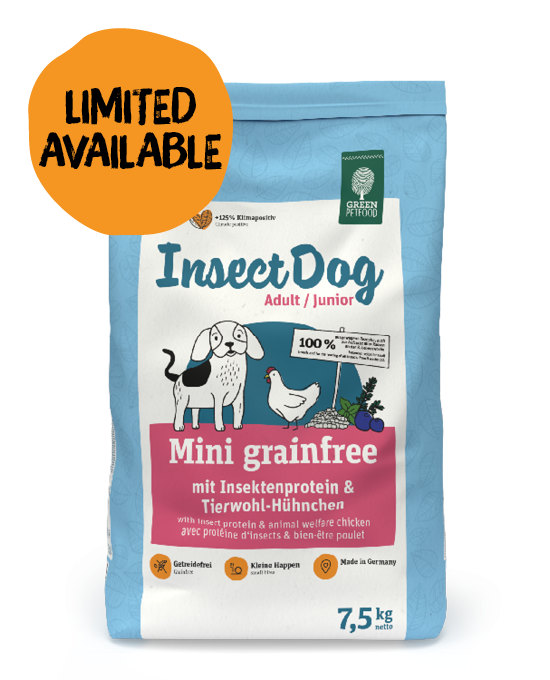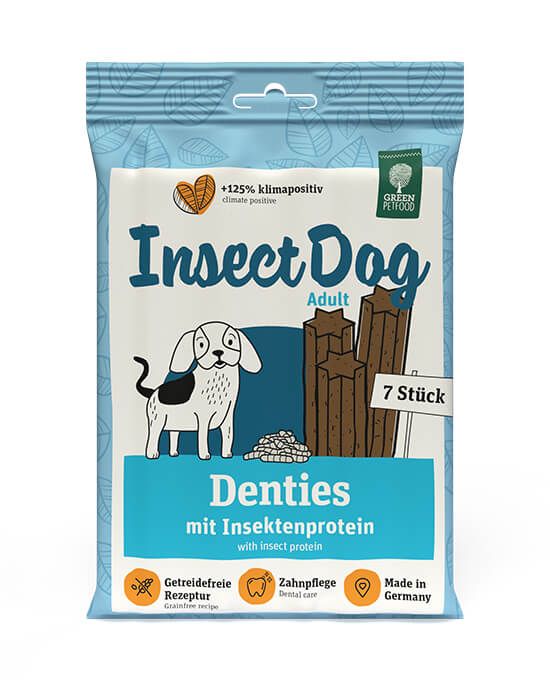Dog farts: what could be the cause? What helps?
Just like humans, dogs can suffer from flatulence. But while we suppress our farts or leave the room first, our pets have no such inhibitions. As a result, things can get pretty stinky. Can you do anything about it? Why does your dog even fart in the first place? And is flatulence in your dog a reason to visit the vet? We answer all your key questions on this topic.
Why is my dog farting a lot?
If your dog farts frequently, this can have various causes. Most are innocuous and (as in humans) related to diet. Puppies can also be prone to farting – flatulence is just the more technical term for this phenomenon.
Relatively harmless causes of flatulence in dogs:
- poorly digested food
- food that is unsuitable for dogs
- swallowing too much air when eating
- intolerance to certain foods
- eating excrement
- insufficient physical activity
- long-term medication
Dry Dog Food to stop flatulence
Expert info
Some breeds of dog are more susceptible to flatulence than others. For example, this tendency is shared by all bull breeds (such as French or English bulldogs) because they have a highly sensitive digestive system. Older dogs also frequently suffer from flatulence because their digestion does not work as well as it did previously.
What happens in the dog’s body to cause flatulence?
Flatulence in your dog is due to intestinal gases. To be more precise, an excess quantity of these gases. The gases are created if your dog cannot digest its food properly. In response, bacteria in the rectum are activated that are not really appropriate for this purpose. When these bacteria break down food in the bowel, they produce gases that then seek a way out. When your dog farts, the smell is due to the sulphur contained in the gases.
At what point should I go to the vet if my dog has flatulence?
As well as innocuous causes, your dog’s flatulence could be due to illness. Possible health conditions include:
- irritable bowel syndrome (potential symptom: excessive mucous in diarrhoea)
- gastroenteritis
- chronic inflammatory bowel disease
- bowel obstruction
- tumour

Your dog could also be infected with Giardia, worms or other intestinal parasites. Another possibility is that the pancreas is not functioning properly. Only a vet can diagnose how serious the flatulence is in your dog and whether one of the aforementioned conditions could be the cause.
But when should you head to the vet’s surgery? One indicator is if your dog’s flatulence is accompanied by diarrhoea or vomiting. Also, if your dog is constantly farting (i.e. has regular flatulence), you should definitely seek medical assistance to identify the cause.
These symptoms are also grounds for a visit to the vet:
- extremely smelly farts or stools
- unusual appearance or consistency of stools
- a swollen, extended stomach
- loud noises in the stomach or intestine
- abdominal pain or cramping
- a contorted back
- lack of appetite and weight loss
Expert info
Irrespective of these symptoms, if your dog has flatulence and you have an odd feeling about it, a visit to the vet is a good idea. Better safe than sorry!
What can you do if your dog farts?
Is your dog farting a lot, but the vet has confirmed this is harmless flatulence? There are a few things you can do.
Ways to combat flatulence in dogs
- Gentle stomach massage to release the gases
- In acute cases: offer a bland diet, for example chicken and unsalted rice
- Use a slow-feeding bowl to prevent too much air being swallowed when eating
- Ensure a calm eating environment
- Allow multiple dogs to eat separately
- Divide the daily food ration into smaller portions
- Avoid offering food from the table / your own food
- Ensure adequate physical activity (except immediately after eating)
- Switch older dogs to a senior dog food
- If a food intolerance is suspected or has been identified, switch to a sensitive feed
- Avoid lots of treats and snacks between meals
What foods are responsible for a dog farting a lot?
Diet is the most common cause of harmless flatulence in dogs. If your dog is farting a lot, this could be due to specific foods or components in the feed. Dogs find certain foodstuffs difficult or even impossible to digest. These are not suitable for inclusion in your dog’s diet.
Foods that can cause flatulence in your dog:
- mushrooms
- peas, beans and other pulses
- broccoli
- cabbage
- foods containing lactose
- fatty foods and fat in general
- offal
- foods that are very high in protein or with low-quality protein (including some dog chews)
- meat containing lots of connective tissue
Expert info
Avoid giving your dog leftovers or food from the table. Even if your dog begs ever so sweetly, human food often causes flatulence in dogs and should not form part of their diet. In many cases, this food is not suitable for the canine digestive tract and does not provide all the vital nutrients a dog needs.
Could an intolerance be the source of my dog’s flatulence?
Flatulence can be a sign that your dog is unable to digest certain foods. This happens if key enzymes are lacking that would normally be used to break down the relevant foodstuffs. The result can be flatulence and discomfort.

Examples of foods that can trigger an intolerance in dogs include:
- certain kinds of meat (poultry, pork, beef, etc.)
- milk and dairy products
- fish
- eggs
- wheat and other cereals
To find out whether your pet has a food intolerance you can implement an exclusion diet. This involves feeding your dog a single source of protein and carbohydrate, e.g. chicken with potatoes. If symptoms improve, this indicates that these two sources are not the culprits.
After this, you can return to feeding your dog the original food. If the flatulence returns, you will know there must be an ingredient that your dog cannot tolerate. Repeat the process until you know exactly which foods your dog can tolerate
Important
Always consult your vet before embarking on an exclusion diet. For adult dogs, the process should take no longer than eight weeks. For puppies and young dogs, the time involved will generally be shorter. Otherwise, there is a risk that the animal may not get all the necessary nutrients. A vet will also be able to offer specific advice on how to go about an exclusion diet.
Can a change of feed help for a dog farting a lot?
If your dog has a sensitive stomach or even a food intolerance, a change of feed may help alleviate flatulence. Grains (particularly wheat) are often the reason why dog food cannot be tolerated. A grain-free variety could be the right choice but is not always the solution. For example, a grain-free product will not help if your dog is sensitive to common protein sources such as beef or poultry.
In which case, try our InsectDog Sensitive. In this product, the source of protein is insects, which have so far hardly ever caused a reaction in dogs. The main reason for this is that insects have hitherto been a rare source of protein in dog food, and another benefit is that they are not pumped full of antibiotics.
How should I switch the feed if my dog farts?
Do you want to change your dog’s food due to flatulence? Follow these steps:
- Always take a gradual approach to changing food.
- Add a little bit of the new feed to the old variety, reducing the quantity of the old feed accordingly.
- Increase the proportion of new feed slightly day by day.
- Do this until you have completely replaced the old food with the new product.
- Allow your dog a good two weeks to transition to the new variety.
Remember to observe your dog closely when changing food. The aim is for the new food to be better tolerated than the old one. So, make sure you note the aforementioned symptoms and how frequent any flatulence is. If the condition improves, everything is going to plan. If nothing changes, however, it could be that the new food does not suit your dog. In this case, why not try a different feed designed for sensitive dogs.
If your dog’s flatulence worsens when the food is changed, stop the food switch. This suggests the new food contains an ingredient that cannot be tolerated by your dog.
Expert info
You should always adopt a gradual approach to changing food, regardless of whether you are making the change due to your dog farting a lot or for other reasons. The same rule applies if you decide to change from dry to wet food or vice versa.

What food is recommended if your dog has flatulence?
You can get special dog food to reduce flatulence. These products generally include most sensitive feed varieties and products designed for older dogs.
The gluten contained in grain is a common cause of flatulence. Grain-free dog food contains no wheat or other grains, such as barley, rye, oats or spelt.
Is your dog farting a lot despite a grain-free feed? This could be a sign that another ingredient is causing the intolerance. Animal proteins are one possible trigger.
In this case, try a dog food that contains an unusual source of protein, such as InsectDog Sensitive. In addition to easily digestible rice, this product contains insect protein as the sole source of high-quality protein. Almost all dogs are able to tolerate this ingredient.
Expert info
It is important for dog food to contain ingredients that are easy to digest. In addition, the product should only contain one type of meat. Too great a mixture can pose a problem for your dog’s stomach. The same is true for treats and other snacks.
My dog farts: what does that have to do with gut flora?
A dog farting a lot can be a sign that the intestinal flora are not completely healthy. This is vital for well-regulated, healthy digestion. Healthy gut flora also have an impact on other issues:
- immune system or immune response
- susceptibility to stress
- strain on the liver due to metabolic toxins
- development of intolerances or allergies
A vet can find out whether there is anything wrong with your dog’s intestinal flora. If so, they will also be able to advise you on how to tackle the problem. Probiotics and prebiotics might be beneficial. But other remedies may also help gut flora and their bacteria, including toxin binders, gel-forming fibres or antibiotic herbs.
In summary: important information if your dog has flatulence
A dog farting a lot is not immediately a cause for concern. In many cases, thinking about your pet’s diet can help as common causes include food, treats, or too much air in the stomach. Even if the farting is annoying for you and your dog, at least it is not a sign of anything serious in this instance.
Good solutions for canine flatulence include massage, a slow-feeding bowl or a change of feed. Dog food designed for a sensitive gastro-intestinal tract contains only ingredients that are easy to digest. This can aid your dog’s digestion. But make sure you do not switch food too quickly.
It is also important to keep an eye on your dog’s flatulence. Is it persistent and becoming a chronic condition, or is the smell extremely unpleasant or accompanied by other symptoms such as vomiting or diarrhoea? If so, contact a vet immediately because the cause could be an underlying illness and you should seek clarification.










